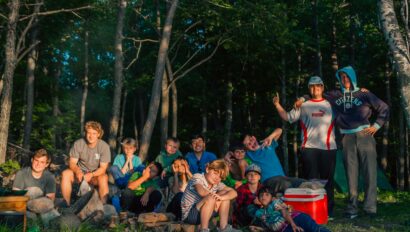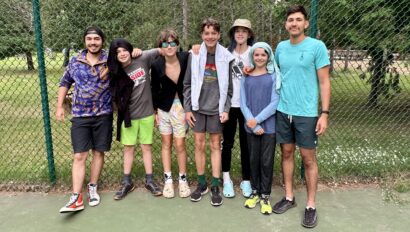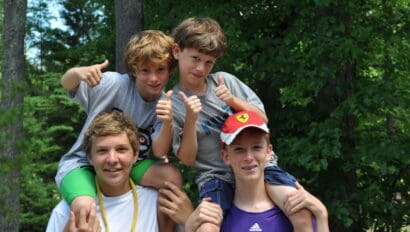Character has been a mainstay of Camp Chippewa for 90 years. It is a place rich in character. (It is also a place rich in characters, as even a cursory look reveals a litany of notable, entertaining, and eccentric persons: Jerry Graham and JP Endres bellowing the words to “A Little Bit o’ Luck” during final banquets, Peter Evans balancing wooden benches on his chin, Alex Haft prancing about while imitating one of his rotation of invented characters, just to name a few.)
There is no doubt that characters help make a summer at Camp Chippewa inviting, non-judgmental, and hilarious for campers. All types of people are welcome, the cliques of the school year seemingly evaporate into the high blue skies, and the resulting hodgepodge of people in the small-camp environment allows new friendships to blossom. But even more integral to Camp Chippewa than its characters is the character which the program creates.
Developing character, through adventure, inspired by tradition is Camp Chippewa’s mission statement. Of those three pillars, character, or “the aggregate of features and traits that form the individual nature of some person or thing,” is the one that parents see when their sons return home and that fuels our campers and alumni during life’s challenges. It is why camp leaves such a lasting mark on its campers. At Camp Chippewa, character is achieved through the acquisition of four values: engagement, resilience, confidence, and leadership.
Engagement: Each day, campers participate in the growth-centered programs of Camp, connecting with people and themselves in an active and screen-free outdoor environment.
To go to summer camp is to engage. Isolated from phones, video games, and social media, campers experience a freedom of the mind and a reinvigoration of the senses not felt at home. The overstimulation of screens is removed, and in its absence the wonders of childhood, delights of unstructured play, and connection to nature and the larger world can flourish. Campers engage with a daily schedule of activities—some challenging, some fun—and all outdoors. They also engage face-to-face with people. Meals are served family-style and shared with a table of eight. A tent may be shared with a boy from a different state and a different background. Life at camp is engaging in a way that builds people up.
Leaving camp, campers are present, grateful, and more ready to engage in the delights, challenges, and relationships of life.
Resilience: Each day, campers experience novel situations and challenges and are aided by a support network of role models and friends as they build grit and explore life outside of their comfort zone.
Camp is so memorable, so impactful, and so deeply moving for people because of—in large part—how challenging it is. Being away from home is hard for everyone, especially the youngest campers. Each step of the way, caring counselors are there for the campers. As sources of security and connection, the staff ensure the campers are safe, and feel safe, as they experience new things. Kids build grit at camp because not everything is easy, and without the usual support systems at home campers learn to trust themselves.
Leaving camp, campers are more willing to try new things, and better able to bounce back from adversity and disappointment.
Confidence: Each day, campers build physical and emotional skills and overcome challenges, gaining self-belief as they experience progression on their camp journey.
The natural evolution of resilience is confidence. Not only are campers taking on new challenges, but they are doing so without the reassuring presence of their parents. And the triumph over these challenges is the basis of the robust confidence that campers leave Chippewa with. Supported by staff and their friends, campers overcome homesickness, trying new foods, sleeping in a tent, learning to swim, climbing to the top of the climbing tower, and paddling across a lake into a headwind. Each progressive challenge helps form a mindset of optimism and self-belief. It should come as no surprise that former campers are more successful in transitioning to life beyond high school.
Leaving camp, campers think “I have done hard things before. I can do this.”
Leadership: Each day, campers encounter opportunities to be both self-reliant and to contribute toward shared goals, fostering attitudes of independence and interdependence that will serve them for a lifetime.
Obviously, the oldest campers gain leadership skills when spending four weeks in the Chippewa Leadership Training Program. But leadership is a trait baked into the program for all ages of campers. The daily chore of cleaning the cabin is an exercise in accountability and teamwork. During overnight canoe trips, campers are formed by the powerful impact of shared goals. Empathy, initiative, and communication are practiced each day as campers navigate life in the Chippewa community.
Leaving camp, campers are better prepared as teammates and more able to step forward as compassionate leaders.
Character matters.
And… there will always be plenty of characters too!

Above (left to right): Jerry and JP in their yearly vocal performance, Peter displaying one of the world’s stronger chins, and Alex as “Sal,” a real estate tycoon aiming to turn Camp Chippewa into a sprawling JC Penny shopping complex.


